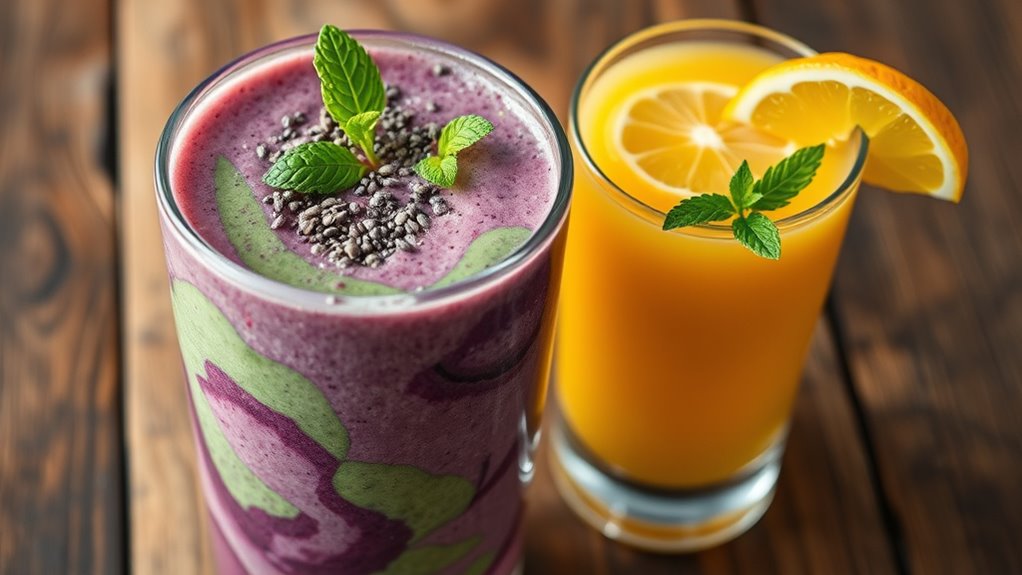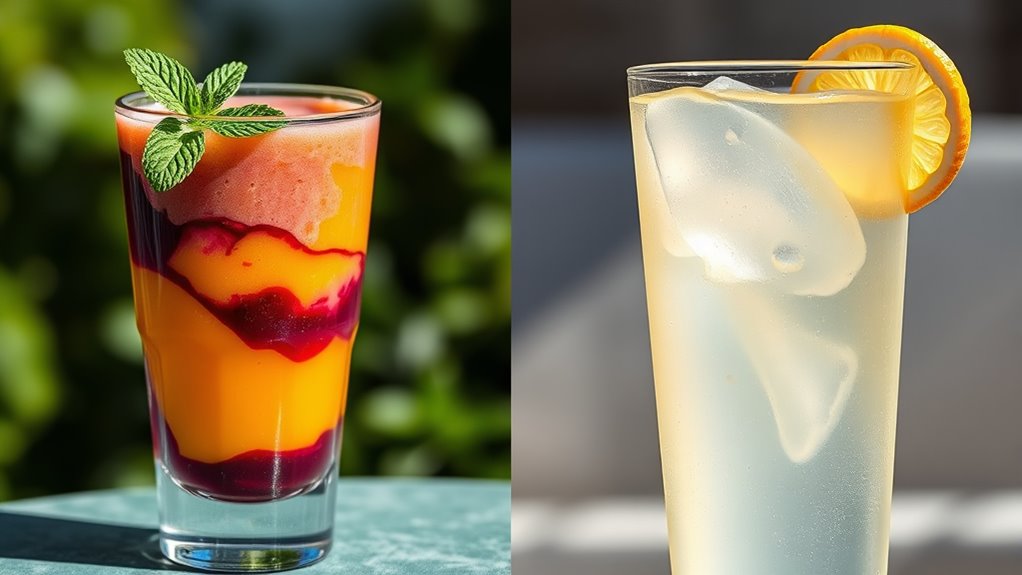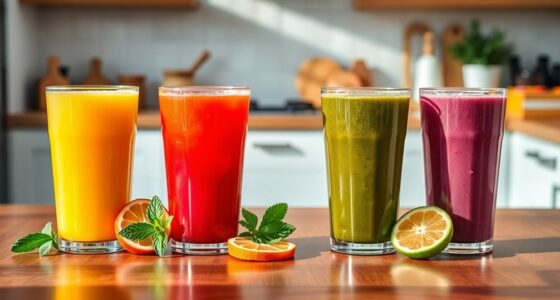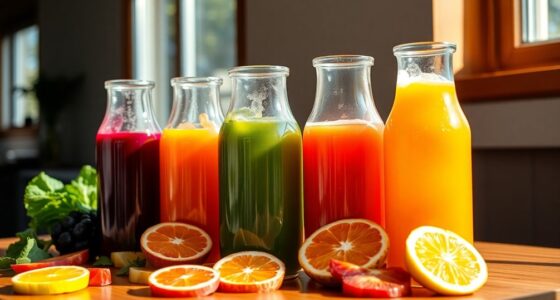If you’re choosing between smoothies and juices, consider their impacts on nutrients and sugar. Smoothies blend whole fruits and vegetables, preserving fiber and nutrients, and slowing sugar absorption, making them more filling and healthful. Juices remove fiber, concentrate sugars, and can lead to faster blood sugar spikes. Both can be healthy, but controlling added sugars and portion sizes matters. To discover how each option can fit into your diet, explore further about their pros and cons.
Key Takeaways
- Smoothies retain more nutrients and fiber, supporting better digestion and gradual nutrient absorption compared to juices.
- Juices have higher sugar concentrations and lack fiber, leading to quicker sugar absorption and potential blood sugar spikes.
- Homemade smoothies and juices allow control over added sugars and ingredients, offering healthier customization options.
- Smoothies are more filling due to fiber, while juices are concentrated and can lead to higher calorie and sugar intake.
- Choosing between smoothies and juices depends on health goals, with smoothies favoring nutrient retention and juices offering quick, concentrated nutrients.

When choosing between smoothies and juices, understanding their differences can help you make healthier choices. One key aspect to consider is nutrient retention. Smoothies, made by blending whole fruits and vegetables, tend to retain more nutrients because the fiber remains intact. This fiber not only preserves vitamins and minerals but also slows digestion, allowing your body to absorb nutrients more gradually. Juices, on the other hand, involve extracting liquid from produce, which often strips away most of the fiber. As a result, juices may lose some nutrients during the extraction process, especially those bound to fiber, making them less nutrient-dense than smoothies. If you’re aiming for maximum nutrient intake, smoothies generally serve you better because they preserve more of the natural goodness found in whole produce.
Another important factor is sugar content, which can vary considerably between smoothies and juices. Juices tend to have higher sugar concentrations because they remove the fibrous pulp, leaving behind a concentrated liquid rich in natural sugars from the fruit. Without fiber to slow down absorption, these sugars enter your bloodstream more quickly, potentially causing blood sugar spikes. Smoothies, however, contain the entire fruit or vegetable, including the fiber, which helps moderate sugar absorption. The fiber acts like a buffer, slowing digestion and preventing rapid increases in blood sugar levels. This makes smoothies a better choice if you’re watching your sugar intake or trying to avoid energy crashes associated with quick sugar absorption.
It’s also worth noting that many commercial smoothies and juices can contain added sugars or sweeteners, further increasing the sugar content and decreasing health benefits. Always check labels or prepare your own at home to control what goes in. When you blend whole fruits and vegetables into smoothies, you’re not just keeping more nutrients; you’re also managing sugar levels better than with many store-bought juices. Keep in mind that portion size matters too—drinking a large glass of juice can deliver as much sugar as a candy bar, while a smoothie with a balance of ingredients can be more filling and less sugar-dense. Additionally, opting for unsweetened options can further enhance the healthfulness of your beverages.
Frequently Asked Questions
Which Method Retains More Fiber, Smoothies or Juices?
You’ll find that smoothies retain more fiber than juices because they blend whole fruits and vegetables, preserving fiber’s benefits. This enhances fiber preservation and boosts nutrient density, making smoothies a better choice if you want to maximize fiber intake. Juices, on the other hand, strip out most fiber during the straining process, reducing fiber preservation and nutrient density. So, if fiber is your goal, smoothies are the way to go.
Are Smoothies or Juices Better for Weight Loss?
Imagine a weight loss journey as a balancing act—smoothies often come out ahead because they help with calorie control and serve as a meal replacement. You can add protein and fiber to keep you full longer, making it easier to stick to your goals. Juices, while invigorating, usually lack fiber and can spike your calorie intake. So, smoothies are generally a smarter choice for weight loss.
Do Smoothies or Juices Have Higher Sugar Content?
Smoothies generally have higher sugar content than juices because they include whole fruits, which retain natural sugars and fiber. The sweetness comparison shows smoothies often taste sweeter due to the blending of fruit pieces, while juices mainly extract liquid, concentrating sugars. Both contain natural sugars, primarily fructose, but smoothies may also have added sugars if you include sweeteners or flavored ingredients. Be mindful of portion sizes to manage sugar intake effectively.
Which Option Offers More Vitamins and Minerals?
You’ll find smoothies generally offer more vitamins and minerals because they include whole fruits and vegetables, preserving their nutrient density. Juices, on the other hand, often have fewer nutrients due to the removal of fiber. When comparing calories, smoothies tend to be more filling and nutrient-rich, making them a better choice for maximizing vitamin intake. So, if you want more nutrients, opt for a smoothie over juice.
Can Smoothies or Juices Help Improve Digestion?
Think of smoothies and juices as your gut’s best allies. They can help improve digestion by providing digestive enzymes and boosting gut health. Smoothies, with their fiber content, slow digestion and promote regularity, while juices deliver quick nutrients and enzymes that aid digestion. Both options support your gut, but smoothies might have the edge for long-term gut health thanks to their fiber, making digestion smoother and more comfortable.
Conclusion
Choosing between smoothies and juices depends on your health goals. If you want fiber and sustained energy, smoothies are your best bet, while juices offer quick nutrient absorption. Did you know that nearly 60% of Americans consume fewer than five servings of fruits and vegetables daily? Incorporating either can boost your intake, but balancing both might be the smartest move. So, experiment with both to find what keeps you energized and satisfied throughout your day.
Cindy thoroughly researches juicing trends, techniques, and recipes to provide readers with practical advice and inspiration. Her writing style is accessible, engaging, and designed to make complex concepts easy to understand. Cindy’s dedication to promoting the advantages of juicing shines through her work, empowering readers to make positive changes in their lives through the simple act of juicing.











